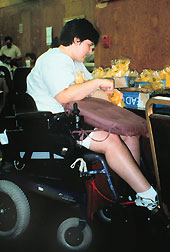Washington Contacts
State Agency Responsible for Providing Services to the Developmentally Disabled
The Division of Developmental Disabilities (DDD), part of the Department of Social and Health Services uses state and federal funds to provide or purchase supports and services for eligible persons and their families. DDD provides ongoing support services and training for eligible persons with paid jobs in a variety of settings and work sites. Employment may include individual or group options in the community and specialized industry settings. Employment services are available for people 21 years of age and older. Employment services are provided through contracts with local county governments. Counties develop services through a planning process and contract with providers.
P. O. Box 45310
Olympia, WA 98504-5310
Phone: 360-725-3413
Fax: 360-407-0955
Web: http://www1.dshs.wa.gov/ddd/contacts.shtml
State Agency Responsible for Overseeing Employment Opportunities for the Developmentally Disabled
The Division of Vocational Rehabilitation (DVR), also part of the Department of Social and Health Services (DSHS) serves individuals with disabilities that are an impediment to employment. They assist individuals with disabilities in getting and keeping a job. DVR is a both a state and federally-sponsored program. DVR works in partnership with the community and businesses to develop employment opportunities for people with disabilities. To locate the nearest Division of Vocational Rehabilitation go to their website.
Sheltered Employment
Additionally, the state vocational rehabilitation agencies in Washington use CARF accreditation to accredit vocational facilities. CARF requires providers to conduct an annual comprehensive safety inspection, emergency procedures, personnel training on safety issues, and critical incident reporting, among other things.
The DDD has an Office of Quality Assurance and Self-Directed Services that is responsible for advancing the values of health and safety, power and choice, status, integration, relationships, and competence in the lives of people with developmental disabilities. The Office of Quality Assurance monitors the health and safety of individuals receiving services through the Department of Social and Health Services. The guidelines for quality assurance can be found at their web site.
Employment services are provided through contracts with local county governments. Counties develop services through a planning process and contract with providers. These providers offer support and training for eligible persons with paid jobs in a variety of settings and work sites. This may include individual or group options in the community and specialized industry settings.
Central Office
P.O. Box 45310
Olympia, WA 98504-5310
Phone: 360-725-3413
Fax: 360-407-0955
For a list of local DDD offices go to:
http://www1.dshs.wa.gov/ddd/contacts.shtml
Competitive Employment
DSHS Division of Developmental Disabilities provides ongoing support and training for eligible persons with paid jobs in a variety of settings and work sites. This includes individual or group options in the community, and specialized industry settings. Community Access provides activities, special assistance, advocacy and education to help eligible persons participate actively in their community.
Central Office
P.O. Box 45310
Olympia, WA 98504-5310
Phone: 360-725-3413
Fax: 360-407-0955
Web: http://www1.dshs.wa.gov/basicneeds/dis2esdd.html
For a list of local DDD offices go to:
http://www1.dshs.wa.gov/ddd/contacts.shtml
Health and Safety
The Washington Department of Labor and Industries (L&I) offers a service that at the employers request, a safety and health consultant will come to the business and analyze employee safety and accident prevention programs. The consultation is specifically designed to help you increase safety awareness, prevent accidents, and manage workers' compensation costs.
Division of Occupational Safety & Health (DOSH)
P. O. Box 44001
Olympia, WA 98504
Phone: (360) 902-4200
Fax: (360) 902-4202
Web: http://www.Ini.wa.gov/Safety/Basics/Assistance/Consultation/about.asp
The U.S. Congress created the Occupational Safety and Health Administration (OSHA) in 1971 to develop and enforce workplace safety and health rules throughout the country. States may choose to run their own safety and health programs as long as they are at least as effective as OSHA. Washington state has chosen to run its own program and most employers in the state, therefore, are subject to enforcement by Washington Department of Labor and Industries (L&I) and not by federal OSHA. L&I changed the name of the division responsible for workplace safety and health from WISHA to the Division of Occupational Safety and Health, or DOSH, for short. DOSH applies to almost every employer and employee in Washington.
Division of Occupational Safety & Health (DOSH)
P. O. Box 44001
Olympia, WA 98504
Phone: (360) 902-4200
Fax: (360) 902-4202
Web: http://www.osha.gov/dcsp/osp/stateprogs/washington.html
Reporting Abuse and Neglect
Chapter 74.34 RCW mandates an immediate report to the Department of Social and Health Services (DSHS) of cases of suspected abuse, neglect and financial exploitation of a vulnerable adult. When there is a suspected case of physical assault, the case must be also reported to law enforcement.
Adult Protective Services can be part of a community's involvement in aiding a self-neglecting vulnerable adult. With the person's consent, APS will do everything possible to ensure his or her safety and well being once the case has been reported and investigated.
If there is reason to suspect a vulnerable adult is being abused, or neglected, call the DSHS toll-free EndHarm hotline anytime day or night at 1-866-END-HARM (363-4276). The Complaint Resolution Unit toll-free hotline is 1-800-562-6078 if the person that you suspect is being abused or neglected is living in a nursing home, boarding home, or adult family home.
Protection and Advocacy
The Washington State Developmental Disabilities Council is a council appointed by the Governor to plan comprehensive services for Washington State's citizens with developmental disabilities.
2600 Martin Way East, Suite F
P.O. Box 48314
Olympia, WA 98504-8314
Phone: 360-586-3558
Voice and TTY:800-634-4473
Web: http://www.ddc.wa.gov
Washington Protection and Advocacy System is a private non-profit organization that protects the rights of people with disabilities statewide. Their mission is to advance the dignity, equality, and self-determination of people with disabilities. They work to pursue justice on matters related to human and legal rights.
315 Fifth Avenue South, Suite 850
Seattle, WA 98104
Phone: 206-324-1521
800-562-2702
Web: http://www.wpas-rights.org

